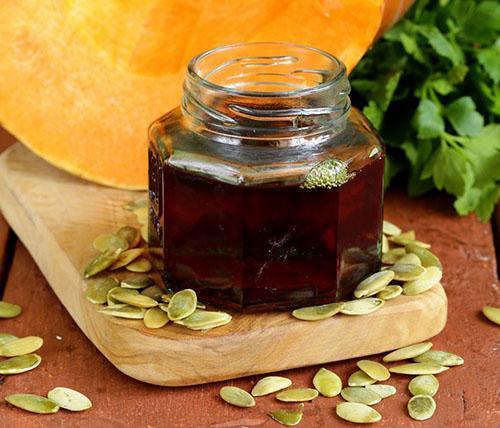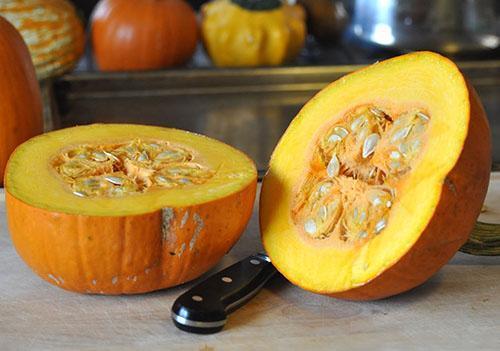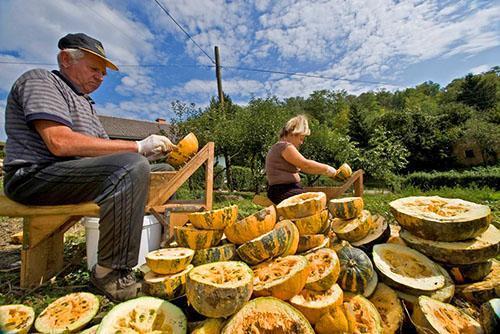Features of the use of pumpkin oil
 An unpretentious pumpkin that adorns vegetable gardens until the very autumn frosts beds, is famous for its versatility and beneficial properties of the pulp. Lovers of delicious hearty snacks do not ignore the seeds of this plant. But the main treasure is pumpkin seed oil, obtained from ripe seeds and considered one of the healthiest vegetable fats.
An unpretentious pumpkin that adorns vegetable gardens until the very autumn frosts beds, is famous for its versatility and beneficial properties of the pulp. Lovers of delicious hearty snacks do not ignore the seeds of this plant. But the main treasure is pumpkin seed oil, obtained from ripe seeds and considered one of the healthiest vegetable fats.
If pumpkin pulp had a reputation for food for the poor for centuries, then oil first obtained in medieval Austria began to be valued almost on a par with gold. It is not surprising that a dark, with a greenish tinge, thick liquid in those days was allowed to be used only as a medicine, and who would have decided to add such a precious product to porridge or dough.

So what is this natural product valued for? What are the benefits and harms of pumpkin seed oil, and how to take the medicinal product? Read on: benefits of pumpkin seeds!
Pumpkin seed oil composition
 If we consider the composition of pumpkin seed oil, it becomes clear why the substance was so prized by our ancestors. Each drop of dark liquid contains elements important for the human body, and compounds such as vitamins A and vitamin C, E and F, P and group of vitamins B.
If we consider the composition of pumpkin seed oil, it becomes clear why the substance was so prized by our ancestors. Each drop of dark liquid contains elements important for the human body, and compounds such as vitamins A and vitamin C, E and F, P and group of vitamins B.
The oil is rich in essential acids, which include linoleic, stearic, palmitic and linolenic acids.
These compounds actively fight the excess and deposits of cholesterol, and the phytosterols and phospholepids present in the oil prevent cholesterol from being absorbed into the intestinal tissue, prevent the formation of tumors, activate carbohydrate and fat metabolism, and have a positive effect on the quality of the skin and their regeneration.
The flavonoids in pumpkin seed oil are natural antioxidants that also have antimicrobial effects.
Tocopherols and carotenoids, as well as numerous micro- and macroelements, contribute to human health. Among the most important minerals are magnesium, iron, selenium, calcium and phosphorus, as well as zinc, which supports metabolism and the state of the immune system, which promotes the production of insulin.
However, when using pumpkin seed oil, do not forget that it is an extremely nutritious product, whose calorie content reaches 899 kcal per 100 grams.
What diseases are natural remedies most useful for, and how to take pumpkin seed oil?
The use of pumpkin seed oil in the treatment of diseases of the digestive tract
 A few centuries ago, healers recommended that patients with complaints about the work of certain internal organs drink oil from pumpkin seeds. The study of the composition of this tool has given amazing results. It turns out that medics of the Middle Ages not only did not exaggerate the benefits of the product, but unknowingly underestimated it.Pumpkin seed oil, rich in phospholepides, valuable fatty acids and vitamins, including the rather rare vitamin K, is an excellent folk remedy for diseases of the pancreas and liver.
A few centuries ago, healers recommended that patients with complaints about the work of certain internal organs drink oil from pumpkin seeds. The study of the composition of this tool has given amazing results. It turns out that medics of the Middle Ages not only did not exaggerate the benefits of the product, but unknowingly underestimated it.Pumpkin seed oil, rich in phospholepides, valuable fatty acids and vitamins, including the rather rare vitamin K, is an excellent folk remedy for diseases of the pancreas and liver.
Once in the body, the oil promotes the restoration of liver cells and normalizes bile secretion. This is an effective natural protection against the development of inflammatory processes in the liver and biliary tract, the formation of areas of adipose tissue in it.
Pumpkin seed oil is used as a hepatoprotective agent if a person suffers from liver damage caused by:
- oncological diseases;
- exposure to chemicals;
- alcohol.
Pumpkin seed oil has the same active effect on the stomach and intestines. Anti-inflammatory and wound-healing properties of the product are often in demand here, which are provided by linoleic and linolenic acids, hotel vitamins, chlorophyll, which gives the oil an unusual greenish tint, as well as flavonoids and phytosterols. Pumpkin seed oil provides invaluable help in the treatment of such common diseases as peptic ulcer and gastritis of varying severity, enterocolitis and colitis, gastroduodenitis and flatulence.
Pumpkin seed oil is applicable for constipation, and is also in demand as an antiparasitic drug.
The use of pumpkin seed oil for the health of the heart and blood vessels
 The study of the biochemical composition of pumpkin seed oil confirmed that the product is saturated with substances capable of:
The study of the biochemical composition of pumpkin seed oil confirmed that the product is saturated with substances capable of:
- have a beneficial effect on the elasticity of the blood vessel walls;
- strengthen the tissues of the circulatory system;
- protect the heart and blood vessels from negative influences of various nature and inflammation.
Oil components from pumpkin seeds are good helpers in the fight against excess cholesterol, which, especially in middle-aged and older people, often forms sclerotic plaques, thereby contributing to an increase in pressure and the progression of atherosclerosis.
Prophylactic use of pumpkin seed oil is the key to long-term productive work of the vascular system and heart.
For medicinal purposes, the agent is used for hypertension and atherosclerosis, arrhythmias and ischemia, as well as for anemia.
Pumpkin seed oil for men's health and urogenital area
Pumpkin seed oil has long been used by folk medicine as a proven and extremely effective remedy for men's health and longevity.
 Indeed, a product with a unique composition shows all the signs:
Indeed, a product with a unique composition shows all the signs:
- diuretic;
- bactericidal;
- anti-inflammatory;
- antineoplastic agent.
Due to the presence of carotene, vitamin E, zinc, ascorbic acid and magnesium, pumpkin seed oil can be used along with medications to maintain the performance of the prostate gland, normalize potency and spermatogenesis. The use of small doses of oil helps to significantly reduce the risk of developing inflammation in the genitourinary system and promotes the regeneration of damaged mucosal tissues.
Pumpkin seed oil for women's health
Pumpkin seed oil has proven itself in the prevention and treatment of diseases of the female genital and reproductive spheres, which are of an inflammatory or bacterial nature.
 The use of pumpkin seed oil can have a beneficial effect on the hormonal background of a woman, the state of the nervous system, and also alleviate the condition with painful menstruation accompanied by spasms. Sometimes doctors advise oil to reduce the intensity of menopausal manifestations. In addition, the complex of vitamins and minerals, acids and natural antioxidants have a positive effect on the development of the fetus, which is extremely important when using pumpkin oil by a pregnant woman.
The use of pumpkin seed oil can have a beneficial effect on the hormonal background of a woman, the state of the nervous system, and also alleviate the condition with painful menstruation accompanied by spasms. Sometimes doctors advise oil to reduce the intensity of menopausal manifestations. In addition, the complex of vitamins and minerals, acids and natural antioxidants have a positive effect on the development of the fetus, which is extremely important when using pumpkin oil by a pregnant woman.
The use of pumpkin seed oil for the treatment of various ailments
 Today, the sedative properties of pumpkin seed oil, which is in demand for insomnia, causeless anxiety, frequent headaches and other disorders, are actively studied and used. Introducing small portions of pumpkin seed oil into the daily diet or using it for dressing culinary dishes will help both young people and the older generation feel more energized, strengthen the body's immune defenses, and reduce the risk of developing cancer, inflammatory, infectious and allergic diseases.
Today, the sedative properties of pumpkin seed oil, which is in demand for insomnia, causeless anxiety, frequent headaches and other disorders, are actively studied and used. Introducing small portions of pumpkin seed oil into the daily diet or using it for dressing culinary dishes will help both young people and the older generation feel more energized, strengthen the body's immune defenses, and reduce the risk of developing cancer, inflammatory, infectious and allergic diseases.
The anti-inflammatory, bactericidal and anti-allergic properties of pumpkin seed oil are very much appreciated by general practitioners, therefore the product is widely used in inflammatory diseases of the respiratory and oral organs, skin lesions and some dermatological diseases.
The latter include such dermatological and cosmetological problems as:
- acne;
- allergic rashes, diathesis and urticaria;
- burns and other traumatic injuries of the skin;
- seborrhea and dermatomycosis;
- psoriasis and eczema;
- herpes;
- trophic ulcers and bedsores.
External and internal application of pumpkin seed oil gives good results when used to improve the quality of nails, skin and hair.
How to use pumpkin seed oil?
 Before using pumpkin seed oil inside, be sure to get a specialist's recommendation. In the presence of diseases of internal organs, as well as anemia, metabolic disorders and hormonal levels, pumpkin seed oil is recommended to be taken one hour before meals, three times a day, a teaspoon.
Before using pumpkin seed oil inside, be sure to get a specialist's recommendation. In the presence of diseases of internal organs, as well as anemia, metabolic disorders and hormonal levels, pumpkin seed oil is recommended to be taken one hour before meals, three times a day, a teaspoon.
You should not drink the oil with water, but if there is any discomfort after swallowing, it is better to take a sip of fruit juice or eat a small wheat crouton.
Reception is carried out in courses, the duration and feasibility of which it is more correct to clarify with the attending specialist. And to maintain tone and well-being, pumpkin seed oil can be used with vegetable salads, cereals and other dishes, where the product is added as a spicy healthy seasoning. The only limitation is that a valuable product must not be heated, otherwise it not only loses the lion's share of its benefits, but also changes its properties.
Outwardly, compresses, lotions and irrigation with pumpkin seed oil are used.
Contraindications to the use of pumpkin oil
 While there are a lot of benefits from using pumpkin seed oil, harm from misuse of this product is also possible. In any case, you should refuse to use oil with an expired shelf life or that has been in unsuitable conditions for a long time, for example, in the light or in a hot room.
While there are a lot of benefits from using pumpkin seed oil, harm from misuse of this product is also possible. In any case, you should refuse to use oil with an expired shelf life or that has been in unsuitable conditions for a long time, for example, in the light or in a hot room.
In addition, people with diagnosed diabetes must obtain permission from their doctor before taking pumpkin seed oil. The same requirement applies to persons prone to food allergies or suffering from exacerbation of gastrointestinal diseases. As a side effect of taking the oil, frequent loose stools can be observed, which is not useful for a tendency to diarrhea. With cholecystitis, accompanied by the formation of stones, pumpkin seed oil requires extremely careful use, otherwise painful movement of stones and exacerbation of the disease cannot be avoided.